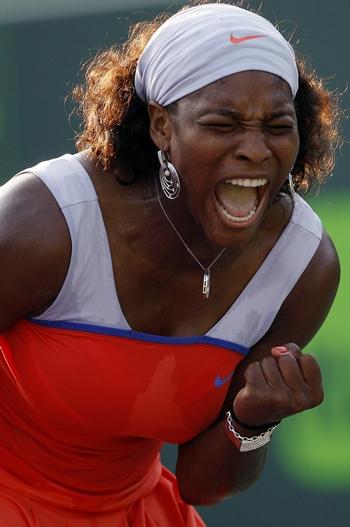 Women's tennis powerhouse Serena Williams has achieved many highs in a sparkling career. From small WTA tournament victories to 23 Grand Slam titles, the lady has seen it all. However, the accolades were not easy coming; she had to make many sacrifices to reach the zenith in the women's game.
Women's tennis powerhouse Serena Williams has achieved many highs in a sparkling career. From small WTA tournament victories to 23 Grand Slam titles, the lady has seen it all. However, the accolades were not easy coming; she had to make many sacrifices to reach the zenith in the women's game.
Williams was brought up in the Compton area of Los Angeles, one of the most violent neighbourhoods in the United States, along with four sisters, including Venus. She shared a single bedroom with her four siblings, but with only two bunks in the room she had no bed of her own.
"Isha and Yetunde (her two oldest sisters) had the two beds on top and Lyn and Venus the two below. I had to sleep with a different sister each night, sort of alternating between their beds.
"But I didn"t see it as a negative. To be honest, I felt lucky because it gave me a chance to get real close to each of my sisters," she told the Times Online.
Serena also is always a picture of aggression on court, but that's just one aspect of her well-rounded personality. A follower of Jehovah's Witnesses, she is deeply religious.
"You know, that was the No 1 thing in our lives growing up, even more important than tennis," Williams told Times Online. "My mom is a really strong Jehovah"s Witness and my dad, although he's not practising, made sure we went to Kingdom Hall every Tuesday, Thursday and Sunday. We always sat in the third row and never missed a service. Even today, it's more important to me than anything else. My faith gives me balance and perspective."
Serena's faith was tested and was driven into deep depression when in September of 2003 Yetunde, her eldest sister, was murdered in Los Angeles.
"I still find it difficult to talk about what happened with Tunde," says Williams. "I was sharing a room with Lyn in Toronto when I found out. We just couldn't take it in. I had been talking to Tunde on the phone earlier that day and she had been real excited about what was going on in her life, and mine. I just couldn't make sense of it. It was like something out of a dream."
The trauma of the loss took a toll on Serena and that got reflected on her performances. She plummeted down the rankings, hitting No 140 in the world.
"I needed to take time out from tennis because I had an injury to my leg and had all sorts of emotional and spiritual wounds," she says. "I started to see a therapist because I was in a bad place and needed to talk things through."
Williams also went to Ghana and Senegal in 2006, where she ran tennis clinics and gave out polio vaccines. "It was unbelievable to think that my ancestors had endured such suffering before they even got to America and were put into bondage.
"It put things in perspective, but it also made me think. If my people could endure that kind of suffering, I could endure anything."
This brought about a turnaround in her perspective. A rank outsider at the 2007 Australian Open, she went on to clinch the Slam by beating Maria Sharapova 6-1, 6-2.
Since then she has won three of the subsequent 11 Grand Slams and seemed on course for the US Open until she exploded during the semi-final, verbally abusing a court official for foot-faulting her during her defeat by Kim Clijsters, the eventual tournament victor.
"It was out of character and I really regret it," she says. "I am a passionate person and I just lost it because it was an iffy call at a key moment. I wrote the line judge a really long letter of apology and she understood."
As a parting shot she said "You want to know my message to people?
"If you want to achieve your dreams, you gotta work real hard. There's no lottery ticket to success. Sure, sometimes you fall down -- and I have fallen an awful lot.
"But then you have to live the words of Muhammad Ali: 'Being a champion isn't about what you do when you are on top; it's about what you do when you are knocked down.' "
More of Serena's persona can be found in her memoir titled On the Line, where talks about life, body image and her love for her family.








 © 2025
© 2025